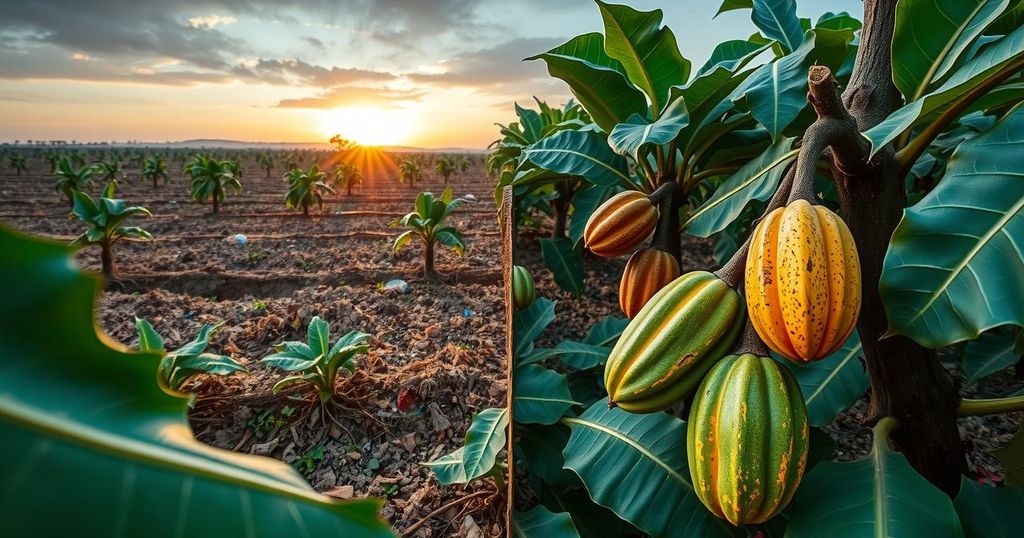Cocoa Crisis: Climate Change Threatens Chocolate Production and Prices
A Christian Aid report reveals the severe impact of climate change on cocoa production, causing prices to rise by 400%, with cocoa grower livelihoods at risk. Extreme weather events have led to significant crop losses in West Africa, particularly in Ghana and Côte d’Ivoire. Industry leaders are calling for immediate action to address these challenges to ensure sustainability in the chocolate supply chain.
A recent report by Christian Aid has highlighted the detrimental effects of climate change on cocoa production, coinciding with the Valentine’s Day rush for chocolate. In the years leading up to 2024, cocoa prices have surged by 400%, driven by extreme weather events such as the 2023 heatwave in West Africa, which was made ten times more likely due to climate factors. This unsettling trend is jeopardizing chocolate’s future and the livelihoods of cocoa growers, particularly in West Africa where countries like Côte d’Ivoire and Ghana dominate global cocoa production.
Extreme weather has drastically affected the cocoa harvests due to rising temperatures and irregular rainfall patterns across vital growing regions. Over the past decade, cocoa-producing zones in countries like Ghana and Côte d’Ivoire have experienced an annual increase of at least three weeks of excessively high temperatures. This alarming rise in temperature correlates with reduced cocoa yield and soaring prices globally, with record highs of $12,605 per ton reported in December 2024.
The impact of climate change on cocoa production has not only inflated prices but also posed a serious threat to the livelihoods of growers. According to experts, this crisis began in 2023 due to heavy rainfall in normally dry periods, resulting in crop diseases and subsequent drought conditions in 2024. Christian Aid emphasizes the urgent need for a strategic response to cut emissions and provide targeted climate finance for cocoa growers to ensure their survival.
Experts within the chocolate industry express their concerns over the crisis. Andy Soden from Kernow Chocolate noted that the past four years have demonstrated significant impacts from changing climate conditions, contributing to fluctuations in cocoa supply and demand dynamics. Other companies, including Nestlé, have also acknowledged this threat, stressing the urgency of addressing climate change to sustain cocoa production and profitability in the future.
Statements from cocoa growers themselves further demonstrate the dire consequences of the cocoa crisis. Amelia, a cocoa farmer in Guatemala, lamented the death of her cocoa trees and the lack of food for her family due to water shortages. Similarly, Aurelia, another farmer from Guatemala, expressed her deep concern over the loss of crops, attributing this loss to a failure to protect ecosystems, which jeopardizes future generations.
Industry representatives, such as Alexander Carnwath of the Fairtrade Foundation, reiterated the necessity for sustainability across the cocoa supply chain. He emphasized the critical link between fair pricing for producers and effective climate action, arguing that rich countries must align their trade and climate policies to support low-income cocoa farmers. Meanwhile, Gemma Whitaker of Whitakers Chocolates highlighted the commitment of her company to sustainable practices and support for Fairtrade cocoa, stressing the importance of immediate action to safeguard cocoa’s future.
In summary, the report by Christian Aid reveals that cocoa production is under severe threat from climate change, with rising temperatures and erratic weather patterns driving up cocoa prices and undermining the livelihoods of growers. Industry leaders and farmers are urging for decisive action to address climate challenges, emphasizing the need for fair trade practices to secure the future of cocoa and the chocolate industry.
Original Source: reliefweb.int




Post Comment